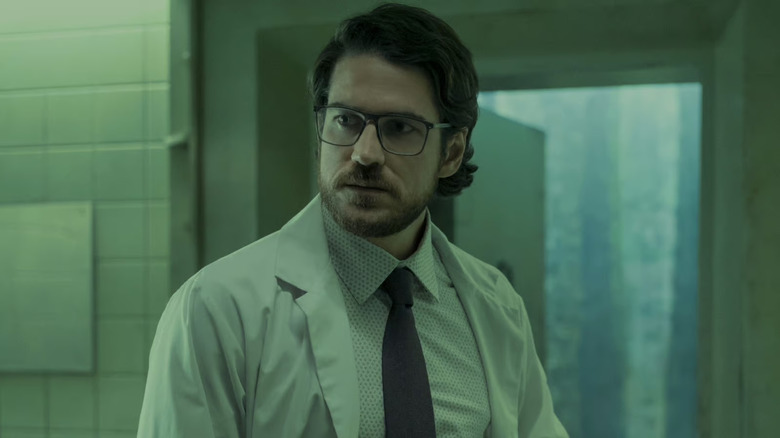Gen V's Biggest Villain Finally Shows Her True Colors
One constant among the universe of "The Boys" is that there will always be a non-supe or two at the top of the corporate chain, surviving not through physical strength but through sheer self-preserving strategy. The main show currently has Stan Edgar, a cold-hearted businessman who is inexplicably unfazed by Homelander's many threats over the years. Does Edgar have something up his sleeve, or is he really just that tough and immovable? We still don't know for sure.
On the spin-off's side of things, we have Indira Shetty, the university's new dean, who manages to keep these supe students in line despite knowing that most of them could destroy her with relative ease. And unlike Edgar, Shetty isn't entirely capable of hiding her emotions; a few weeks back the supe detective Tek Knight was able to figure out one of her secrets just from the subtle signs in her body language.
In other words, Shetty's not quite on Edgar's level; she's more like Madeline Stillwell from "The Boys," season 1: a woman who almost perfectly managed to keep Homelander wrapped around her finger through sheer charisma. But in the end, Homelander discovered Stillwell's role in a conspiracy that affected him deeply, and no amount of charm could save her. The season 1 storyline feels especially relevant now, as Shetty is wrapped up in her own conspiracy that will almost certainly be discovered by our supe main characters, one of whom is extremely violent and unstable. It's not clear if Shetty can survive the recovery and, after this latest episode, we're not sure if we want her to.
Just as cruel as the rest
"Jumanji" reveals that not only is Shetty running the underground "Woods" operation, imprisoning supes and experimenting on them, but she's actively pushing for even more inhumane treatment of the prisoners inside. When Dr. Cardosa tells her about his breakthrough — how the virus they've been working on can take a supe's powers away — Shetty tells him to give the prisoner an even more concentrated dose even though she sees it's making her sick. At the end of the episode, when she finds out the prisoner has died from the concentrated injection, she doesn't care at all.
Perhaps even more coldblooded is the way she's revealed to have manipulated Cate. Shetty approached the young supe at the most vulnerable period of her life, told her exactly what she needed to hear, and then used that established trust to coerce her into brainwashing Golden Boy for years. When they first met, Shetty was a welcome reprieve from Cate's fearful, judgmental parents, but slowly Shetty revealed herself to be an even worse parental figure. Shetty is largely responsible for Golden Boy's death, and has forced Cate to continue using her powers to mess with her friends' minds despite all her grief and guilt.
This episode gives us Shetty at the most cold and calculating we've ever seen her. We've always assumed she wasn't trustworthy of course — no authority figure is in a series like this — but it's chilling to see just how far back her manipulations go, and how easily Shetty is able to pretend to care about the people she's manipulating. Shetty's always been an antagonist in "Gen V," but now we know for sure she's the show's main villain.
Do the ends justify the means?
On the other hand, Shetty's coldness in this episode is counterbalanced by the obvious upside of this new virus her scientists have created. A virus that removes a supe's superhuman abilities would be a total gamechanger, and one that could potentially save many more lives than she's taken. In "The Boys," the closest thing we've had so far to this sort of technology was Soldier Boy in season 3, who was able to permanently de-power supes with an unpredictable sonic burst that would kill any regular people nearby.
This new technology, meanwhile, seems like it could be used a lot more effectively. Most of all, it seems like it could easily take down Homelander, a feat that could very well save the whole world. Homelander aside, this technology could even wipe out supes as a whole, something that Butcher's been trying to do since the day we first met him.
Of course, we're under no illusions about the motives of Shetty's scheme. Vought has been developing this technology as a way to keep its more erratic supes in check, not out of concern for human lives but for the company's financial bottom line. An out-of-control supe means bad press, and bad press hurts the stock price. But every so often an evil company's financial incentives just so happen to line up with what's morally correct, and this might be one of those times.


